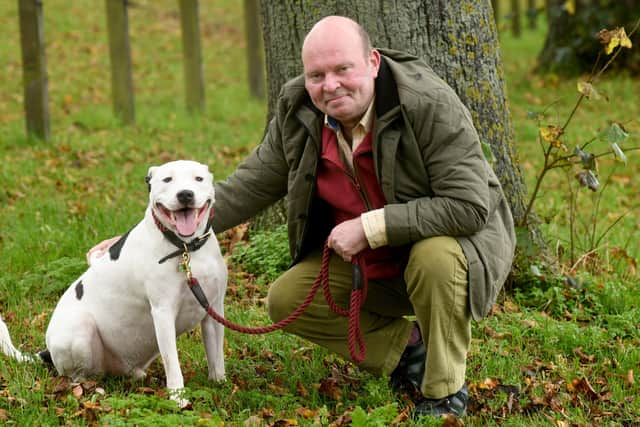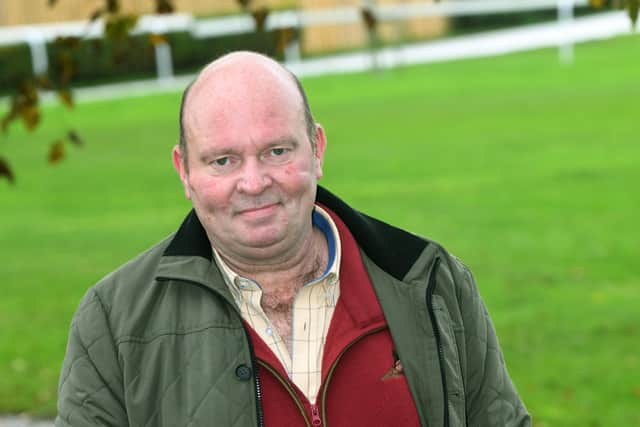A former alcoholic whose life was saved by a liver transplant says he sometimes feels unworthy
Fifty year old Craig, from York, says at the time of the transplant he felt ‘‘unworthy’’ of the gift of life being offered to him.
“I brought liver disease on myself because of my addiction to alcohol,” says Craig, who has not touched a drop of alcohol for three-and-a-half years.
Advertisement
Hide AdAdvertisement
Hide Ad“I felt I was unworthy of the liver and also all the care and attention I received from the doctors and nurses. I did struggle mentally for a while but then I realised that I had to make the most of my new life and I now spend a lot of my time raising awareness and talking to people.”


One in six adults in Yorkshire and the Humber could have undiagnosed liver disease, the British Liver Trust’s Love Your Liver mobile screening and scanning unit found after visiting the region this month.
The charity visited York, Leeds, Doncaster, Grimsby, Sheffield and Hull and screened or scanned passers-by who were interested in finding out more about their liver health.
Of the 344 people scanned, 52 (15 per cent) had a high reading and were sent to their doctor for further tests.
Advertisement
Hide AdAdvertisement
Hide AdLiver disease is a leading cause of death in England and Wales, with more than 40 people dying from the disease every day. Hospital admission rates for liver disease in Yorkshire and the Humber are above the average in England and rising steadily, with 8,330 admissions in 2019/20 compared to 5,270 in 2010/11. The increase is caused mainly by the rise in people who are overweight and the numbers of people who are drinking too much alcohol.


Even though Craig knew he was an alcoholic, he didn’t realise he had liver damage until it was too late.
“I never really felt unwell,” recalls Craig, who started drinking heavily in his late 20s.
Years went by with few consequences, although he did lose his driving licence at one point, until his early 40s when routine bloods showed his liver enzymes were elevated.
Advertisement
Hide AdAdvertisement
Hide Ad“That should have been the warning sign sufficient to rein my dependency in, but it did not, as it was by this stage a necessity to get through life, an addiction.”
“I just brushed it off and carried on as before.”
But around seven years later, in the summer of 2018, Craig started to worry about the colour of his eyes. “I asked a colleague if my eyes looked okay, I knew they weren’t – they were yellow.”
He arranged to see the hepatologist at York hospital and became clear that his liver was failing. “There were other symptoms at this point, but now something was showing ‘on the outside’. I live 250 miles away from my family and live alone. It was easy at this point not to talk to anyone about it. So, I didn’t. My consultant arranged for me to be admitted as an in-patient, for an on-ward detox and further supportive treatment. I spent nearly two months on the ward and didn’t tell my family I was there. My boss was aware, and he was so supportive I cannot thank him enough.
Advertisement
Hide AdAdvertisement
Hide Ad“After discharge, my consultant started talking about transplant. This struck the fear of God into me. I confided in a friend who was supportive, and I started the process of seeing whether I was suitable for transplant. That introduced me to the great team at Leeds St James Hospital.”
Craig’s symptoms worsened and he became extremely ill.
“I was admitted again on several occasions with huge amounts of fluid in my tummy, and, as it progressed, vomiting blood.
“The eligibility for transplant was dependent on many things, abstinence, and being fit enough to withstand surgery amongst other things. I had to bite the bullet and tell my family too (none of the anticipated bad reactions, only full of support). After various assessments, and tests, I was accepted and signed the consent form for transplant on March 18 2019. I alerted my neighbours too, as the call could come any day, and I would need to get to Leeds quickly.”
Craig continued to deteriorate and on May 20 2019 he was having fluid drained off his tummy when the call came. A neighbour collected him and they went to St James.
Advertisement
Hide AdAdvertisement
Hide Ad“I woke in ITU the following day and recovery began.” He was discharged on June 1, quite weak but eating and drinking and able to climb stairs.
“I took a taxi home, as no one was at home for me, and began my recuperation. The support from the post-transplant teams at St James was amazing – medically, nutritionally, and psychologically. It’s hard to compare the recovery process when you live alone, compared to having a partner there for you. Friends and neighbours supported me, and day by day I grew stronger.”
In lockdown Craig knew that he had to get out and about and exercise to keep his weight down and so adopted a rescue dog Ty. The pair are now inseparable .
“The gift of transplant is the greatest gift an individual can receive from others.
Advertisement
Hide AdAdvertisement
Hide Ad“I find the best way I can give back the debt I owe to my donor and their family (whom I do not know, and have not tried to contact yet) is to give back to those in similar positions. I have enjoyed acting as a complex patient for trainee doctors and the like, sharing experiences in online forums, and hope to do more in the future.
“There are so many horrid conditions that lead to transplant, I feel inadequate and unworthy of the care and attention I received, as in all respects my condition was brought on by myself and my addiction, and that affects me mentally from time to time. But I am so grateful that I have been given a second chance.”
The British Liver Trust’s Love Your Liver campaign focuses on three simple steps to reduce your risk of liver disease:
Drink within recommended limits and have three consecutive days off alcohol every week
Eat a healthy diet and take more exercise
Advertisement
Hide AdAdvertisement
Hide AdKnow the risk factors for viral hepatitis and get tested or vaccinated if at risk
If you are worried that you may be at risk, the British Liver Trust has an online screener, a simple quiz, where you can find out more.
The British Liver Trust also has a helpline number 0800 652 7330
Comment Guidelines
National World encourages reader discussion on our stories. User feedback, insights and back-and-forth exchanges add a rich layer of context to reporting. Please review our Community Guidelines before commenting.